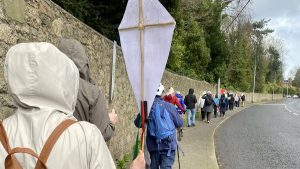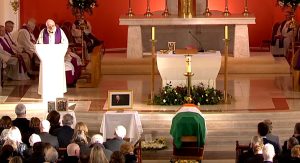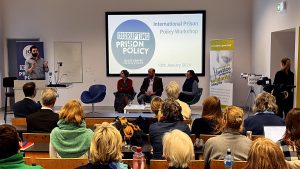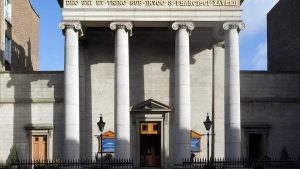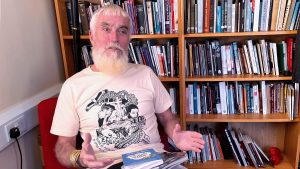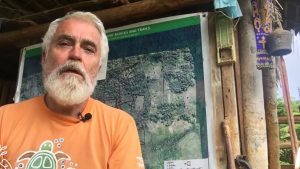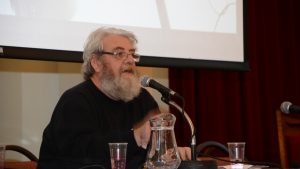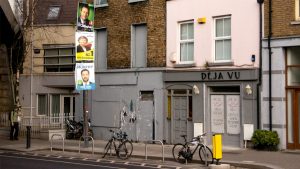Our ‘pointed and practical’ ecology policy
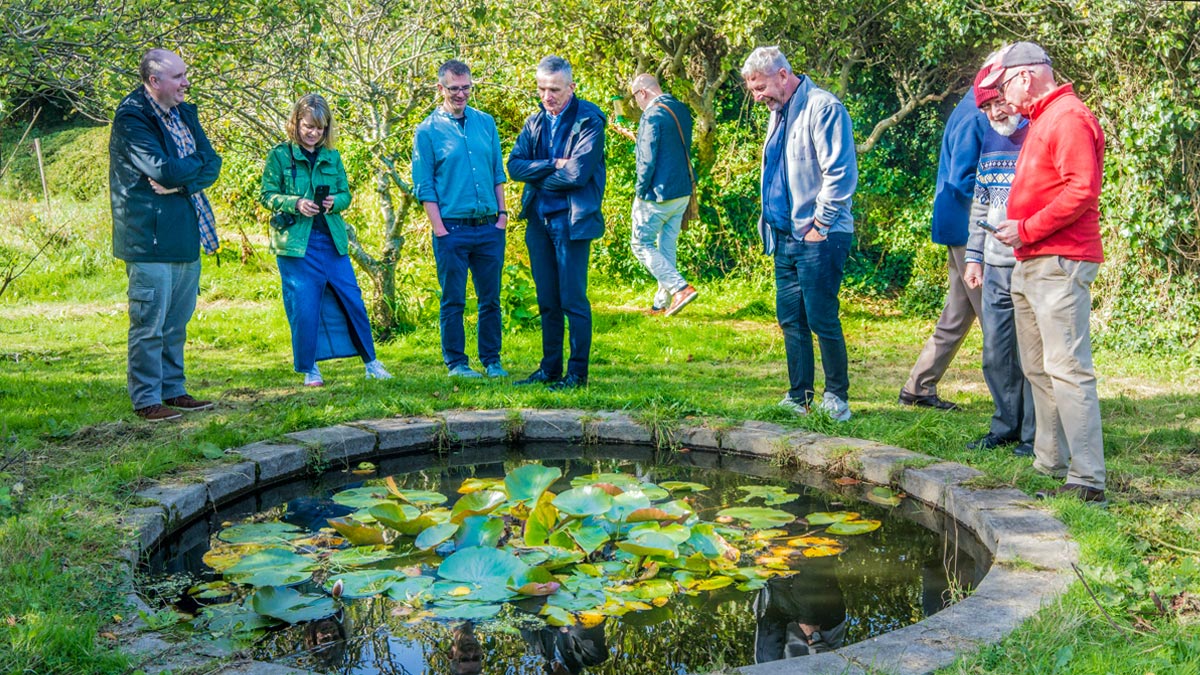
Jesuit Provincial Shane Daly SJ launched the Province Ecology Policy: Caring for our Common Home » on Friday 30 September, 2023. The policy, from the Jesuit Centre for Faith and Justice, forms the basis for the ongoing ecological conversion of all works and communities in the Irish Province.
Jesuits, colleagues, and friends all gathered for the event which started with a ‘meet and greet’ at 12 p.m. followed by a vegetarian lunch at 12. 30pm. After lunch, Brian Grogan SJ and Siobhan McNamara led those attending in a meditative walk around the grounds of Milltown Park and Gonzaga College SJ (see photo). The official launch by Fr Shane Daly SJ took place in the Arrupe Room where people gathered around 2.15 pm.
The Provincial noted that although the policy was officially launched on this particular Friday, it had been finalised and accepted a little over a year ago. He said it was the fruit of communal discernment across the Province and its efficacy would be ensured by a working group consisting of members from across the Province, who would see that the policy was implemented and drive climate and environmental action. (Read the full address notes below).
Dr Ciara Murphy,(JCFJ) who had organised and was chairing the ‘Seedbed’ event then invited Lorraine Bull, from Dublin City Council to speak. Lorraine works as the Biodiversity Officer with Parks, Biodiversity, and Landscape Services for Dublin City, and she spoke about the practical application of ecological and biodiversity programmes in community spaces around the capital.
She gave numerous examples of the biodiversity schemes DCC is engaged in » including targeted tree planting, wild gardens, reduced mowing of parks and public spaces, the negative impact of domestic bee-keeping, and much more.
She was followed by Colm Hogan, Church Outreach Manager with Trocaire who had a comprehensive knowledge of parishes around Ireland that are engaged in a variety of ways of implementing the insights of Pope Francis’ encyclical Laudato Sí.
The event concluded with a talk from Drs Ciara Murphy and Kevin Hargaden of the Jesuit Centre for Faith and Justice, focussing on their book »The Parish As Oasis. You can click here to listen to an interview » they gave to Pat Coyle of Irish Jesuit Communications about the book and the parish work they do based on it.
‘Doing Our Bit’
I am delighted to take the opportunity at this ‘Seedbed’ event to officially launch the policy and showcase some of the work done.
This policy document has several foundations, with the publication of Laudato Sí in 2015 being the initial catalyst. Pope Francis’s call – that we must ‘care for our common home’ – made this encyclical a pivotal moment in the global climate movement.
This is so much more than a document on ecology rather it is a blueprint for reimagining what it means to be human and central to which is relationship with God – ‘Laudato Sí’, mi’ Signore” – “Praise be to you, my Lord. – with other persons – with other creatures who exist, not for us, but God’s glory, and with nature whose resources are given to us for our good and not our exploitation.
In 2019 the UAPs – Universal Apostolic Preferences of Father General Arturo Sosa SJ – were developed for the entire Jesuit movement, with ‘Caring for Our Common Home’ named as one of the four. The Irish Province Apostolic Plan, which builds on the UAP’s for our context lists the development of an ecology policy among its actions. At a national level, the Climate Act and the Climate Action Plan will mean that change is coming to every citizen in Ireland whether we prepare for it or not.
Most recently the Catholic Bishops Conference has asked every Parish to give 30% for Nature, a position which Brian Grogan SJ was involved in bringing forward. This initiative brings into focus the huge shift that is happening within the Irish church in terms of caring for biodiversity and our common home. The Parish as Oasis provides a blueprint for parish and others to follow.
These foundations were the basis for communal discussions across the Province – lay and Jesuits, volunteers and students, people involved in decision-making, and those responsible for implementation – about what was currently happening in the Province and what they would like to see in an ecology policy.
Our ecology policy
The fruit of that communal reflection is the policy we launch today. It is short, concise, pointed, and practical. What is outlined challenges but is achievable in communities and works.
For me, concise, clear, pointed, and practical help overcome the potential for despondency when we imagine the crisis to be so vast as to be unsolvable and when we see the disconnect between political and governmental rhetoric and action. It calls to mind the story, some of you will know from the Quechua (ketch-uh-a) people in Peru.
‘One day, a long time ago and in a faraway place, or so the legend goes, there was a huge forest fire that was raging in the countryside. All the animals were terrified, running around in circles, screaming, crying and helplessly watching the impending disaster. But there in the middle of the flames, and above the cowering animals, was a tiny hummingbird busy flying from a small pond to the fire, each time fetching a few drops with its beak to throw on the flames. And then again. And then again.
After a while, an old grouchy armadillo, annoyed by this ridiculous useless agitation on the part of the hummingbird, cried out “Tiny bird! Don’t be a fool. It is not with those minuscule drops of water one after the other that you are going to put out the fire and save us all !” To which the hummingbird replied, “Could be, but I’m going to do my bit.”’
So how is the Province, its communities, and works going to “do its bit”?”There are six main pillars of the policy document, each involving long-term commitments.
● The first step is essential: to conduct an ecological audit to establish an objective baseline.
● The Province should also aim to reduce its overall emissions aiming to be net-zero by 2050
● Significantly reduce waste – achieving net zero emissions and reducing waste is only achieved when ecological concern is named as part of all individual, community, and work decision-making.
● A fresh look at our investments to ensure they align with our values should take place.
● Manage our green areas to enhance biodiversity – particularly rich with opportunity is Clongowes Wood
● The final pillar is the promotion of the Irish language across the Province, recognising its cultural links to our natural environment.
What has been done?
● This policy though only being officially launched today was finalised and accepted a little over a year ago. There is a working group established, with members from across the Province, to try to implement this policy and drive climate and environmental action.
● One of the larger pieces of work is taking place right here. We are doing a pilot audit and sustainability certification in the Milltown Campus with EcoMerit with the aim of identifying how we can reduce the emissions associated with Milltown.
● A summary of all the work being done can be seen in a slideshow that will be played later. It is safe to say we have made a start.
JCFJ entitled this day a ‘Seedbed’ – we know from the Gospel parable that the seed that fell in rich soil bore much fruit. The ecological seed grows in the soil of an ecological conversion. This policy document is, I hope, the basis for an ecological conversion. The basis for creating a new way of relating to the gift that is creation; the basis of a renewed consciousness of the natural world and our part in it and not above it; the basis for a simple way of living that reflects, for us Jesuits, our vow of poverty – a laboured and complex word – that might better be spoken of as simplicity of lifestyle.
I want to finish with words from the canticle from Isaiah from today’s Morning Prayer from the Liturgy of the Hours:
“For this is the Word of the Lord,
The creator of Heaven,
The God who made the earth and shaped it,
God who made it firm.
The Lord did not create it in vain,
God made it to be lived in.”
Shane Daly SJ,
Irish Jesuit Provincial
30 September 2023




